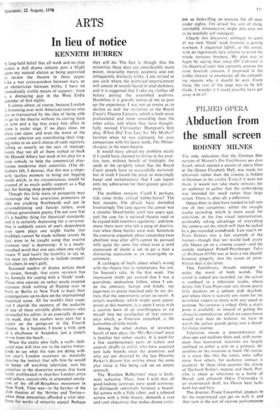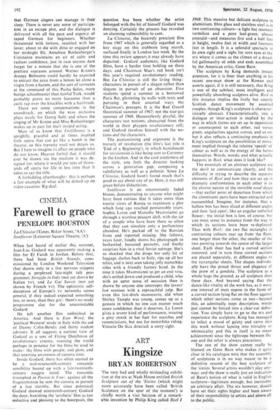FILMED OPERA
Abduction from the small screen
RODNEY MILNES
The only indication that the German film version of Mozart's Die Entfiihrung aus dem Serail, which opened a season of opera films at the Queen Elizabeth Hall, was made for television rather than the cinema is hidden in German in the credits. Even if it were not there, it would not take many minutes for an audience to gather that the undertaking was intended for small rather than large screen. There is, after all, a difference.
Opera films to date have tended to fall into one of two categories: either the straight studio recording which is more usual for television, or the free visual interpretation, preferably taking advantage of everything the camera can do. which will then be tacked to a pre-recorded soundtrack. Last year's Tv Peter Grimes was a fair example of the former—though that too would look pretty silly blown up on a cinema screen—and the unduly maligned Powell-Pressburger Tales of Hoginan (1950) was at least a toe dipped. however gingerly, into the ocean of possi- bilities that is the latter.
This EntfiihrunR, though. manages to make the worst of both worlds. The sound is indeed pre-recorded, yet the action is confined to a television studio, where dainty litle Casa-Pupo-type sets throw pretty little shadows on a salmon pink skycloth, and where there is scarcely any room for the mouthing singers to move with any speed or purpose. No exnense is risked. Only a ship's prow is available. so instead of getting the climactic embarkation, which no opera house would ever dare do without, we have to watch the palace guards going into a dread- ful dance routine.
Television means a preponderance of close-ups and medium shots and, with move- ment thus hampered, reactions are largely confined to either a grin or a grimace, de- pending on the situation at hand. Of course. in a piece like this the comic roles suffer more than others, for audience contact is essential. At these close quarters the charm of Gerhard Stolze's mature and burly Ped- rillo is about as infectious as a bottle of Dettol. and although Oskar Czerwenka is an experienced droll, his Osmin here lacks both fun and fury.
The director, Franz Liesenthal, appears to let the experienced cast get on with it, and they turn in the sort of routine performances
that German singers can manage in their sleep. There is never any sense of participa- tion in an escape plot, and the dialogue is delivered with all the pace and urgency of taped German for beginners. Whether threatened with torture, reunited with her lover, about to die with ditto or engaged on her midnight flit, Anneliese Rothenberger's Constanze maintains an air of calm and radiant confidence, just in case anyone dare forget for a minute that she is one of the prettiest sopranos around. Werner Krenn's droopy Belmonte could hardly be expected to extract the juice from a lemon let alone a virgin from a harem, and the sort of torments at the command of this Pasha Selim, more benign schoolmaster than lustful Turk, would probably prove no more fearsome than a swift rap over the knuckles with a hairbrush.
There are some compensations in the soundtrack, on which the RIAS orchestra plays nicely for Georg Solti and where the singing of Mr Krenn and Miss Rothenberger makes up in part for their insipid acting.
Most of us know that Enifiihrung is a sprightly, graceful and at times inspired little opera that can go like a bomb in the theatre, so this travesty need not detain us. But I hate to imagine its effect on people who do not know. Heaven forbid that it should ever be shown via the medium it was de- signed for, where it would put tens of thous- ands off opera for life in less time than it takes to say the title.
A forbidding afterthought: this is perhaps a fair example of what will be dished up on video cassettes. Big deal.































 Previous page
Previous page